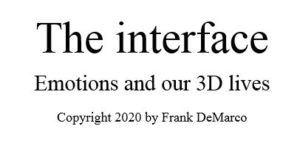
Let’s look at Dirk’s question 3.4.
And 3.5 at the same time, because the reasoning is the same for each.
Yes, I see that.
[3.4. As we feel feelings and express them in ourselves and out to the world, it seems that people are aware of those even before we encounter one another. How does that work?
[3.5. In some cases, I have felt and seen others feel emotions, feelings and moods that seem to have no cause or purpose, only to find that they reflect circumstances that developed later. Is this a case of touching in to the near future? If so, why is that? How does that work?]
People’s feelings are part of the situation, and are there to be experienced intuitively by anyone capable of doing so. As you are well aware, unconscious (non-sensory) processes occur at a speed about a million times faster than conscious processes.
42 million bits of information per second versus 42 bits per second for consciously processed data, if I remember rightly.
And there is the 1/30th of a second delay involved in sensory perception, which has the effect of making the world seem fixed, even dead, as opposed to the world that intuitive processes encounter.
Cause and effect in this case is just that simple. It isn’t that you (we) become aware of the future before it happens, nor that you (we) experience each other magically before something occurs, though it may easily look that way. What is really happening is that your conscious processes are interpreting interactions that occur at blinding speeds (a million times father than consciousness can process data) and thus seem to take place instantly and even faster than instantly.
So this brings us to 3.1 if you intend to deal with it. Or is it based on erroneous concepts?
[3.1. Starting with emotion and feeling. How distinct is the boundary between the primal emotions and the more nuanced feelings, moods, …?]
We see no such boundary, even conceptually. One could easily divide emotions and feelings according to some scheme, just as one can divide the spectrum of light into colors, but that is a conceptual difference, not an inherent difference in kind.
Then I suppose we have caught up with questions, unless you want to address 2.3.
[2-3. How do emotions and feelings relate to one another? Do they overlap?]
The very definitions of emotions and feelings are so flexible and indeterminate as to render the examination more or less useless. Concentrate on the feeling side of life as your means of experiencing the world directly rather than as interpreted through the senses, and you will understand them as well as you need to. Feelings may be rationalized, or understood, or evaded by thought processes; that’s up to the individual. But they are always primary, in two senses of the word: They arrive first, and they are first in importance. This does not say that thinking is of no importance, nor does it deny that thinking may provide greater detailed understanding of your life in the world than may be obtained from feeling alone. But thought follows feeling, sequentially. Therefore, it can never be considered to be the most important way you process reality. Important, yes; a specialized function, yes. Primary, no.
Note – this has nothing to do with emotionality. One may be almost rigid, rather than receptive. It does not affect the fact that it is through feelings that the world is experienced. The 3D-you experiences itself, experiences the world, only because that boundary layer of feeling acts to connect what would otherwise be two unconnected worlds.